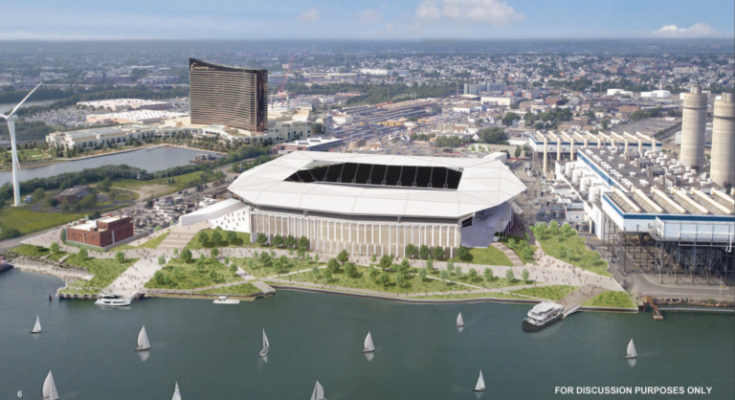The New England Revolution effort to build a soccer-specific stadium in Everett took a major hit at the end of July when state lawmakers failed to pass a wide-sweeping economic development bill at the end of formal session, but the project might not be completely dead.
In recent days, multiple statements made by public officials have given Revolution supporters a glimmer of hope.
The $2.86 billion economic development bill includes — among many other items — language that would remove the “Designated Port Area” (DPA) distinction from a 43-acre parcel of land located at 173 Alford St. in Everett. Currently, the DPA prevents construction of non-industrial projects, including a stadium, making its removal a prerequisite for the Revolution’s current plan.
Yet when the clock finally struck midnight on the legislature’s formal session on July 31 (a moment that technically didn’t arrive until the morning of Aug. 1), the economic development bill was one of several tasks that lawmakers left unfinished.
Usually, that would all but end any discussion of the bill (and its stadium language tucked into Section 166) having any hope of passing before the end of the year.
Yet Gov. Maura Healey has pushed for a special reconvening of formal session “as soon as possible” to “work together with me and my team to get this done.”
Both House Speaker Ron Mariano and Senate President Karen E. Spilka have previously indicated their support for returning, but no timetable has been established.
On Monday, Healey offered some additional comments during an interview with WEEI’s “The Greg Hill Show.” Asked about the possibility of a new Celtics arena at some point in the future, she offered an unprompted supportive comment regarding the economic development bill and the Revolution’s stadium push.
“I’m focused on getting an economic development bill through,” Healey said. “That’s really important because we’ve got to do that — we’ve got to make important investments there. In terms of future stadiums, I have no idea about [a new Celtics area]. I know I like the soccer stadium.”
“We’ll see what happens. They’ve agreed to come back,” Healey said of state lawmakers. “I asked them to come back. We’ll see what happens next month when they come back into session.”
Afterward, Healey spokesperson Jillian Fennimore told Alison Kuznitz of the State House News Service that the timing of the special formal session hasn’t yet been agreed upon.
One of the arguments made by proponents of the Everett stadium proposal is that the site — currently a decommissioned power plant — would require significant decontamination investment. As part of their pitch, the Revolution have signaled that team owner Robert Kraft would pay the $100 million cost to clean up the site as well as the greater cost of eventually building the stadium.
Healey’s spokesperson echoed the environmental focus.
“[Gov. Healey] believes the focus should be on cleaning up the property, advancing environmental justice, and putting the site to the best use for the community.”
State senator Sal DiDomenico, whose constituency includes Everett and who originally proposed a standalone version of the DPA-removal portion of the bill in late 2023, issued a statement on Tuesday reiterating his hope for the project.
“I know there are many people who are disappointed that there was no resolution on the soccer stadium language by the end of July,” DiDomenico said in the statement. “The Economic Development Bill has many parts, not just the stadium, and we have another opportunity to reach an agreement. The legislative process is about compromise and the stadium language is no different. I know there is a willingness from both the Senate and House to find common ground on this issue and I am hopeful that we can get this done.
“This is a transformational project that will leave a lasting and positive impact in an environmental justice community for many years to come,” he continued. “We all know how critical this is, both environmentally and economically, for our region. We are the closest we have been to getting this across the finish line and I am optimistic there is a path forward to make that happen.”



